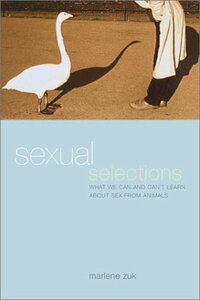Take a photo of a barcode or cover
What I learned from this book is best summed up by this paragraph from its conclusion:
There is not a moral to every story in animal behavior. Sometimes a snake is just a snake, and sometimes snake sex is only about sex in snakes, or sex in egg-laying reptiles. Although a biologist’s job in part is to interpret what organisms do in a broader context, that context does not, and should not, need to include a lesson for human beings. This is true regardless of whether the lesson is something we would like to teach, which means that using animals as vehicles for nonsexist thinking is just as out of bounds as using them to keep women barefoot and pregnant.
It's a wonderful, readable book that I think everyone should read before we let them loose on all the animal behavior (especially sexual behavior) articles in the paper.
There is not a moral to every story in animal behavior. Sometimes a snake is just a snake, and sometimes snake sex is only about sex in snakes, or sex in egg-laying reptiles. Although a biologist’s job in part is to interpret what organisms do in a broader context, that context does not, and should not, need to include a lesson for human beings. This is true regardless of whether the lesson is something we would like to teach, which means that using animals as vehicles for nonsexist thinking is just as out of bounds as using them to keep women barefoot and pregnant.
It's a wonderful, readable book that I think everyone should read before we let them loose on all the animal behavior (especially sexual behavior) articles in the paper.
I enjoyed Zuk's Paleofantasy: What Evolution Really Tells Us about Sex, Diet, and How We Live very much, so was inspired to pick this up as a result. I didn't resonate as much: partly because so much of the science has been outstripped by discoveries driven by DNA analysis (quaintly referred to in this 2004 book as 'DNA fingerprinting') and partly because Zuk is a strong adherent to the primacy of individual gene competition, and tends to underemphasise the role of interspecies competition, particularly when discussing the development on non-reproducing individuals in a species.
Zuk's intense irritation—so amusing in Paleofantasy—also perhaps wears a bit thin when directed at ecofeminism (which certainly deserves it but has failed to become a major force in society) and the poor hippie from the 1970s, whose "Farewell Brother Loon" clearly annoyed her beyond belief and keeps reappearing.
But the book is thought-provoking and interesting, and I generally agree with Zuk's insistence that other animals do not exist to contrast with or provide the basis for our understanding of ourselves. She uses plenty of examples to show that the variety of sex and parenting arrangements in the animal world is dizzying, and that understanding that, shouldn't change our own moral universes. This thinking is better refined in Paleofantasy, however, which feels like a much stronger and clearer version of her argument.
Zuk's intense irritation—so amusing in Paleofantasy—also perhaps wears a bit thin when directed at ecofeminism (which certainly deserves it but has failed to become a major force in society) and the poor hippie from the 1970s, whose "Farewell Brother Loon" clearly annoyed her beyond belief and keeps reappearing.
But the book is thought-provoking and interesting, and I generally agree with Zuk's insistence that other animals do not exist to contrast with or provide the basis for our understanding of ourselves. She uses plenty of examples to show that the variety of sex and parenting arrangements in the animal world is dizzying, and that understanding that, shouldn't change our own moral universes. This thinking is better refined in Paleofantasy, however, which feels like a much stronger and clearer version of her argument.


